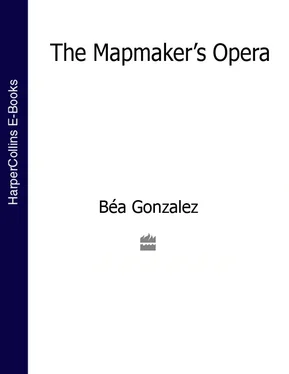Yet the time was not ripe for Emilio to reveal himself. Reasoning that a flustered young woman—one mired in such an ugly dilemma to boot—was unlikely to remember the brief glimpse she had of him before being ushered into the darkness of the confessional to unburden herself of her sins, he merely nodded his head like the best of them and offered up a smattering of the Catholic repertoire for her to repeat in prayer.
And then he waited. Emilio was more sophisticated than Mónica Clemente, who had been raised in a small town far from the danger and profligacy of a city such as Seville, and he knew with certainty that there would be no marriage to the estimado Don Ricardo Medina of the Medinas of Seville, and that the day was fast approaching when the child she carried would no longer be so easily concealed under long capes and carefully arranged shawls.
And as that day approached, Mónica’s eyes, once star-struck with city love and the excitement of this new life so far from her simple home, began to dim. Don Ricardo was told of the child, between heartfelt sobs and pleas for help, and she, naïve as could be, actually expressed surprise when her devout lover recoiled from her in shock and did not, as she had hoped, embrace her in blissful delight.
“I know a family who can take you in, Mónica,” he said, the smell of fear on his breath. He promised her help far from his home, far from Seville and far from his wife. “But you must leave the house before your situation can be perceived.” He insisted, knowing that this affront would be more than Doña Fernanda would be prepared to allow. “In my own home!” she would scream. “Beneath my very nose!” And so on until she bellowed him out of the house and he found himself lying prostrate in the outskirts of Seville. His wife had lungs of steel and a voice as sharp as the blade of a Toledo sword and she would not tolerate news of an illegitimate child with anything less than an uncontainable rage.
“No, no,” she had told him more than once. “Let all the other men in Seville dilly and dally till they’re blue in the face. But you, Don Ricardo, would be wise to respect my family’s good name.”
Everything always began and ended with the family name. But what was a name if not four walls within which to imprison a husband: a stifling ten letters to strangle the life from a man full of it? He liked to look at his reflection and see the energy brimming from his gaze, liked to position himself in front of the mirror and witness the glow—still as strong as a young colt, he would think, ignoring the jowls that tugged at his face, his toothless smile, his ever-protruding girth. Oh no, the girl would not put an end to his conquests. He was no more in love with his young cousin than his own wife, would not let this young thing, silly in the extreme, he now thought, keep him from continuing to explore the mysterious contours of the city of his birth.
Oh Seville, from whose heart sprung Velázquez and Murillo, whose feet gave life to music, city of a thousand guitars, a thousand celebrated songs. City of lights and fiestas and the lament that unites death and life in one single moment of neverending passion and joy. A city that is not just a city but a burning bush, mi amigo —capable of transforming even the most severe Victorian gent into a passionate, emotional fool.
Beware at what point you choose to stop and live your life, Emilio cautions from the depths of his fabulous map. Take heed. For a city has a role to play in how things will unfold. How right he was then and how much truer it seems today, when the choices are endless and we find ourselves adrift on an ocean, swimming desperately from shore to shore in search of that one magic place to call home.
Emilio watched as the days passed and Mónica’s agitation grew more marked, her face more peaked, watched as her every prayer was uttered with more vehemence, waited until the day she literally collapsed into the pew, and it was on that day, finally, that he knew the time had arrived to make his move.
He approached her as she was leaving the cathedral. “Señorita,” he said, “you may not remember, but you asked for confession not too long ago from me.”
“ Ay sí, ” she replied, not really remembering, but sufficiently disoriented to assent with a nod of the head.
“Could we speak over here?” he asked, motioning to a corner, private enough for a talk but public enough so as not to alarm the young woman, who was growing evermore confused. She had been instructed well by the nuns at the Convent of the Carmelitas, knew how to embroider on fine linen, could play the more popular pieces on a piano without the need of a score, had mastered the art of not infusing the playing with any unwomanly passion or verve. She could quote the poetry of the best poets from the Golden Age, knew the adventures of Don Quijote from beginning to end. And, despite her naïveté with respect to Don Ricardo, she knew a thing or two about priests as well. Knew that not all were as wholly dedicated to God as they claimed. Take Don Gustavo, the parish priest back home. He had at least four illegitimate children and a live-in help rumoured to be more lover than maid. So she was not entirely surprised that the young priest—who turned out not to be a priest but a seminarian masquerading as a man whose allegiance to God had already been pledged—was offering a solution to her plight.
“We need each other,” he said.
Mónica coughed, lowered her eyes, and said nothing yet.
Emilio was careful not to scare her off with the weight of his true feelings. The girl was frightened and the girl was lost, he thought. Why tell her more than she needed to know?
“If we marry,” he continued, “you will have a father for your child, and I, an excuse to abandon the cloth.”
Still she said nothing. But she began to raise her eyes, furtively, stole a quick look at the awkward young man who was seeking, incomprehensibly enough, to make her his wife. His nose was prominent and his skin strangely sallow in a land awash with so much sun—but he was not an altogether repulsive man.
He was not cut from the same cloth as Don Ricardo, she could see that. And let us be clear, this bothered her more than she cared to admit. He had neither the bearing nor the clothes, could clearly not offer her the position she so coveted, a life lived among the luxuries she had grown accustomed to in a short time.
Dreams die hard if they die at all, and Mónica’s dream of marriage to Don Ricardo was struggling to remain alive in the face of a certain ugly demise. Perhaps Doña Fernanda would still succumb to some mysterious disease, she thought. Perhaps she would disappear, would be magically transported to another place and time. Perhaps, quizá, perhaps.
Time was galloping. The walls were caving in.
During the next three weeks, Mónica appeared at the cathedral for her regular morning prayers, where she waited to meet with the seminarian on a bench close to the building’s main doors. Here they sat, not too close but close enough, Emilio growing more determined as each day passed, Mónica’s dreams dissolving, minute by minute, bit by bit.
Do you know, we ask our Abuela, the most powerful of all flamenco songs? The seguiriya, sí, but do we really have to ask this from a woman who lived and breathed for flamenco, for her memories of Seville, where the guitar is ascendant and the tap-tap of the dancer beats constantly, helping the city to keep time? The seguiriya, you say, sí, the most powerful gypsy lament, the one that tells of a tragic and bitter existence, sung in a rhythm that alternates between 3/4 and 6/8 time. It is a song worthy of the lament; for those who are not versed in the intricacies of the cante jondo, it is hard to discern where the seguiriya begins and where it ends.
Читать дальше












